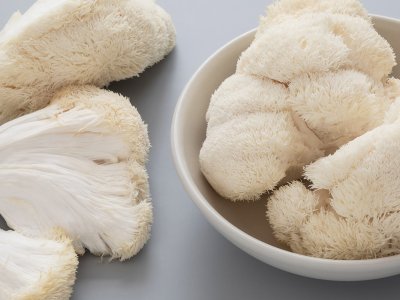Unlike many other medicinal mushrooms that have been used for thousands of years, Lion’s Mane mushroom is relatively new to the Western wellness scene, yet it’s quickly gaining recognition for its unique ability to support neurological health, cognitive function, and overall brain wellness. From stimulating nerve growth to potentially protecting against neurodegenerative diseases, Lion’s Mane offers a natural approach to maintaining and enhancing brain health throughout life.
Understanding Lion’s Mane Mushroom
Lion’s Mane, scientifically known as Hericium erinaceus, is a distinctive white, shaggy mushroom that grows on hardwood trees, particularly oak, beech, and maple. Unlike the typical cap-and-stem structure of most mushrooms, Lion’s Mane features cascading white spines that give it its unmistakable appearance and common name. This unique fungus can be found growing naturally in North America, Europe, and Asia, where it has been appreciated both as a culinary delicacy and a medicinal treasure.
Traditional Use and Cultural Significance
While Lion’s Mane hasn’t been used in traditional medicine systems as extensively as some other mushrooms like Reishi or Shiitake, it does have a notable history in traditional Chinese medicine and Japanese folk medicine. In traditional Chinese medicine, it was known as “Yamabushitake” and was considered a food for both the body and the mind, though its use was limited due to its rarity in the wild.
Neuroprotective Properties and Brain Health
Beyond its immediate cognitive benefits, Lion’s Mane shows tremendous promise as a neuroprotective agent. The mushroom’s bioactive compounds appear to protect neurons from various forms of damage, including oxidative stress, inflammation, and toxic insults that can contribute to neurodegenerative diseases.
Research has investigated Lion’s Mane extract’s potential protective effects against conditions like Alzheimer’s disease, Parkinson’s disease, and mild cognitive impairment. While most of this research is still in preclinical stages, the results are encouraging and suggest that Lion’s Mane may help maintain brain health and reduce the risk of age-related cognitive decline.
The antioxidant properties of Lion’s Mane help combat oxidative stress in the brain, which is a major contributor to neuronal damage and ageing. The mushroom contains various compounds that can neutralize harmful free radicals and reduce inflammation in brain tissue, potentially slowing the progression of neurodegenerative processes.
Some studies have also suggested that Lion’s Mane may help protect against brain injury and support recovery from neurological trauma. While more research is needed in this area, the mushroom’s ability to stimulate nerve growth factor could potentially aid in the repair and regeneration of damaged neural tissue.
Mood and Mental Health Benefits
Emerging research suggests that Lion’s Mane may offer benefits for mood regulation and mental health. Some studies have found that regular consumption of Lion’s Mane can help reduce symptoms of anxiety and depression, though the mechanisms behind these effects are not yet fully understood.
The connection between brain health and mental wellness is well-established, and Lion’s Mane’s neuroprotective and neurotropic properties may contribute to improved emotional regulation and stress resilience. By supporting overall brain function and promoting neuroplasticity, the mushroom may help the brain better adapt to stress and maintain emotional balance.
Some users report feeling more emotionally stable and resilient when taking Lion’s Mane regularly. While these effects are often subtle, they can contribute to an overall sense of well-being and improved quality of life. The mushroom’s ability to enhance sleep quality may also indirectly support better mood and mental health.
It’s important to note that while Lion’s Mane extract may offer mood-supporting benefits, it should not be considered a replacement for professional mental health treatment. Anyone dealing with serious mood disorders or mental health conditions should work with qualified healthcare providers to develop appropriate treatment plans.
Types of Lion’s Mane Extracts and Preparations
The market offers various forms of Lion’s Mane supplements, each with different characteristics and potential benefits. Understanding these different preparations can help you choose the most appropriate option for your needs and health goals.
Whole mushroom powders contain the entire fruiting body ground into a fine powder. These products preserve the full spectrum of compounds found in the mushroom but may have lower concentrations of specific bioactive compounds compared to concentrated extracts. Whole mushroom powders are often preferred by those who want to consume Lion’s Mane in its most natural form.
Hot water extracts are created by simmering the mushroom material and concentrating the water-soluble compounds. This extraction method is particularly effective for capturing polysaccharides and some of the water-soluble bioactive compounds. However, some of the alcohol-soluble compounds, like hericenone, may be lost in this process.
Alcohol extracts use ethanol to extract compounds that are not water-soluble, including some of the important neurotropic compounds found in Lion’s Mane mushroom. These extracts may be more concentrated in certain bioactive compounds but may not contain the full spectrum of water-soluble nutrients.
- Lion's Mane Mushroom and Extracts Powder: Nature's Brain Booster
- Alcohol extracts use ethanol to extract compounds that are not water-soluble, including some of the important neurotropic compounds found in Lion's Mane mushroom.
- Lion's Mane mushroom
Related posts:
 Best Topical Finasteride & Minoxidil Spray for Hair Regrowth
Best Topical Finasteride & Minoxidil Spray for Hair Regrowth
 Blue Grass Guppy: A Mesmerizing Addition to Your Aquarium Life
Blue Grass Guppy: A Mesmerizing Addition to Your Aquarium Life
 Famotidine Pepcid for Cats: What Pet Owners Need to Know for Their Feline Friend
Famotidine Pepcid for Cats: What Pet Owners Need to Know for Their Feline Friend
 Navigating Mental Health: The Importance of Black Therapists in New York for Bipolar Disorder and Depression Treatment
Navigating Mental Health: The Importance of Black Therapists in New York for Bipolar Disorder and Depression Treatment
 The Benefits of Home-Based ABA Therapy for Children with Autism
The Benefits of Home-Based ABA Therapy for Children with Autism
 How Massage Therapy Can Improve Your Health: A Guide for Queens Residents
How Massage Therapy Can Improve Your Health: A Guide for Queens Residents
 A Complete Guide on the Pricing of the Composite Bonding in London
A Complete Guide on the Pricing of the Composite Bonding in London
 Your brief and useful guide to removable orthodontic appliances
Your brief and useful guide to removable orthodontic appliances







